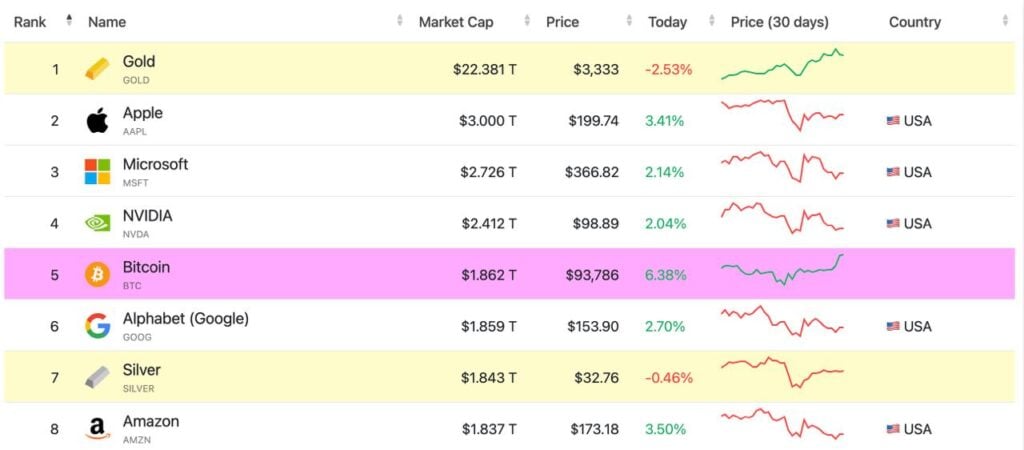In a historic milestone, Bitcoin has surged past Google to claim a spot among the top 5 most valuable assets by market capitalization. This remarkable achievement underscores Bitcoin’s growing influence in the global financial landscape, sparking renewed confidence in its role as a transformative asset class.
Bitcoin Enters Top 5 Assets by Market Capitalization
On April 24, 2025, Bitcoin achieved a groundbreaking feat, surpassing Google’s market capitalization to secure a place among the world’s top five most valuable assets, as Companies Market Cap.


Source: Companies Market Cap
This milestone highlights the cryptocurrency’s meteoric rise amid a shifting economic environment. According to Standard Chartered’s head of digital assets research, Geoff Kendrick, Bitcoin’s upward trajectory closely relates to ongoing uncertainties surrounding the policies of the U.S. Federal Reserve. Kendrick remains bullish, reiterating his bold price predictions:
“This could be the catalyst for the next all-time high, and on that note, I reaffirm my current forecast for Bitcoin—$200,000 by the end of 2025 and $500,000 by the end of 2028.”
While Bitcoin’s climb into the top five may be temporary, its ability to compete with traditional giants like Google has bolstered confidence in its long-term potential. Investors and analysts alike view this achievement as a testament to Bitcoin’s growing legitimacy, challenging the dominance of conventional assets and reinforcing its appeal as a store of value.
Why Is Bitcoin Rising Among Centuries-Old Traditional Assets?
Several key factors drive Bitcoin’s ascent to the upper echelons of global assets.
First, it is increasingly considered a hedge against risks in traditional finance (TradFi) and U.S. Treasury bonds. According to a recent report by US Crypto News, Bitcoin’s appeal as a safe-haven asset has grown amid concerns over inflation, monetary policy uncertainty, and geopolitical tensions. Amid the escalating broader market trends, bitcoin, like many other hedging assets such as gold, which also reached new all-time highs, reflects investor caution in the face of global trade wars and economic instability.
Moreover, the rise of Bitcoin reflects a broader shift toward digital assets. Digital assets are now going to reach mass adoption, as institutional investors increasingly allocate capital to cryptocurrencies. Major financial institutions, once skeptical, are now embracing Bitcoin as a legitimate asset class. The recent flow of Bitcoin ETFs and the growing interest from institutional banks in Bitcoin and cryptocurrency in general are significant developments. Therefore, Bitcoin’s market capitalization is fueled, enabling it to outpace long-established corporations like Google.
The surge in Bitcoin’s value also underscores a cultural and technological shift. As digital assets gain traction, they are reshaping how investors perceive wealth and value. Unlike traditional assets tied to physical or corporate structures, Bitcoin operates on a decentralized blockchain, offering transparency and resilience in an era of economic uncertainty. This unique positioning has made it a focal point for those seeking alternatives to conventional financial systems.
 Bitcoin
Bitcoin  Ethereum
Ethereum  Tether
Tether  XRP
XRP  Solana
Solana  USDC
USDC  TRON
TRON  Lido Staked Ether
Lido Staked Ether  Dogecoin
Dogecoin  Figure Heloc
Figure Heloc  Cardano
Cardano  Bitcoin Cash
Bitcoin Cash  Wrapped stETH
Wrapped stETH  WhiteBIT Coin
WhiteBIT Coin  Wrapped Bitcoin
Wrapped Bitcoin  Wrapped eETH
Wrapped eETH  USDS
USDS  Chainlink
Chainlink  Binance Bridged USDT (BNB Smart Chain)
Binance Bridged USDT (BNB Smart Chain)  Monero
Monero  LEO Token
LEO Token  WETH
WETH  Stellar
Stellar  Coinbase Wrapped BTC
Coinbase Wrapped BTC  Sui
Sui  Ethena USDe
Ethena USDe  Litecoin
Litecoin  Zcash
Zcash  Avalanche
Avalanche  Hyperliquid
Hyperliquid  Shiba Inu
Shiba Inu  Hedera
Hedera  Canton
Canton  USDT0
USDT0  World Liberty Financial
World Liberty Financial  sUSDS
sUSDS  Dai
Dai  Toncoin
Toncoin  Cronos
Cronos  Ethena Staked USDe
Ethena Staked USDe  PayPal USD
PayPal USD  Polkadot
Polkadot  Uniswap
Uniswap  USD1
USD1  Mantle
Mantle  Rain
Rain  MemeCore
MemeCore  Bittensor
Bittensor 


